Социология науки [заметки]
1
Lecourt D. La philosophie des sciences // coll. «Que sais-je?». P.: PUF, 2000.
2
Thackray A. History of Science // A Guide to The Culture of Science, Technology and Medicine / PT. Durbin (ed.). N.Y.: Free Press, 1980. P. 3–69.
3
Feist G.J. The Psychology of Science and The Origins of the Scientific Mind. New Haven: Yale University Press, 2006.
4
Gilpin R. American Scientists and Nuclear Weapon Policy. Princeton: Princeton University Press, 1962; Gilpin R. Science in the Age of the Scientific State. Princeton: Princeton University Press, 1968; Salomon J.J. Science and Politique. P.: Le Seuil, 1970.
5
Science Bought and Sold: Essays in The Economics of Science / P. Mirowski, E.-M. Sent (eds). Chicago: University of Chicago Press, 2002.
6
Fuller S. Social Epistemology. Bloomington: Indiana University Press, 1988.
7
Merton R.K. Foreword // Barber B. Science and Social Order. N.Y.: Free Press, 1952. P. 9.
8
Berthelot J.-M., Martin О., Collinet С. Savoir et savants. Les études sur la science en France. P.: PUF, 2005.
9
Gingras Y. Pourquoi le «programme fort» est-il incompris? // Cahiers sociologiques de Sociologie. 2000. Vol. 109. P. 235–255.
10
Жангра И. Мотив радикализма. О некоторых новых тенденциях в социологии науки и технологии // Журнал социологии и социальной антропологии. 2004. Т. 8. № 5. С. 75–98.
11
До сих пор мы переводили выражения «социология наук» и «социология науки» у автора при помощи устоявшегося в русском языке выражения «социология науки». Поскольку автор делает на этот счет специальное пояснение, мы будем с этого места придерживаться данного разграничения. – Примеч. пер.
12
Lecourt D. L’Amérique entre la Bible et Darwin. P.: PUF, 2007.
13
Мертон Р. К. Наука и социальный порядок // Вопросы социальной теории: Научный альманах. 2007. Т. I. Вып. 1; Философские и научные основания современной социальной теории / под ред. Ю. М. Резника. М.: Независимый институт гражданского общества, 2007. С. 191–207.
14
De Candolle A. Histoire des sciences et des savants depuis deux siècles. P.: Fayard, 1987. P. 188. Речь идет о пересмотренном расширенном издании 1885 г.
15
Ibid. P. 120.
16
Вебер М. Протестантская этика и дух капитализма // Вебер М. Избранные произведения. М.: Прогресс, 1990.
17
Becker G. Challenging Mertons Protestantism-Science Hypothesis: The Historical Impact of Sacerdotal Celibacy on German Science and Scholarship // Journal for the Scientific Study of Religion. 2011. Vol. 50. P. 351–365.
18
Мертон Р. К. Социальная теория и социальная структура. М.: Хранитель, 2006. С. 801.
19
Там же. С. 807.
20
Weber M. Sociologie des religions. P.: Gallimard, 2006. P. 162.
21
Токвиль А. де. Демократия в Америке. М.: Прогресс, 1992. С. 340.
22
Там же. С. 339.
23
Там же. С. 343.
24
Williamson A.W. A Plea for Pure Science. L.: Taylor and Francis, 1870.
25
Rowland H.A. A Plea for Pure Science // Science. 1883. Vol. 2. No. 29. 24 August. P. 242.
26
Вебер М. «Объективность» социально-научного и социально-политического познания // Вебер М. Избранные произведения. М.: Прогресс, 1990. С. 412–413.
27
Мертон Р. К. Наука и социальный порядок.
28
Barber В. Science and the Social Order. N.Y.: Free Press, 1952; The Sociology of Science / B. Barber, W. Hirsch (eds). N.Y.: Free Press, 1962.
29
Бен-Давид Дж. Роль ученого в обществе. М.: НЛО, 2014. С. 49.
30
Конт О. Дух позитивной философии. М.: Либроком, 2011. С. 40–42.
31
Epstein S. Histoire du sida: 2 tomes. P.: Les Empêcheurs de penser en rond, 2001.
32
Sclove R.E. Town Meetings on Technology, Consensus Conferences as Democratic Participation // Science, Technology and Democracy / D.L. Kleinman (ed.). N.Y.: State University of New York Press, 2000. P. 33–48; Gallon M., Lascoumes P., Barthe Y. Agir dans un monde incertain: Essai sur la democratie technique. P.:Le Seuil,2001.
33
Jasanoff S. Designs of Nature, Science and Democracy in Europe and the United States. Princeton: Princeton University Press, 2005.
34
Epstein S. Democracy, Expertise and AIDS Treatment Activism // Science, Technology and Democracy / D.L. Kleinman (ed). Albany: State University of New York Press. 2000. P. 18.
35
Бен-Давид Дж. Указ. соч. С. 172–174.
36
Robitaille A. Le Nouvel Homme Nouveau: Voyages dans les utopies de la post-humanité. Montréal: Boréal, 2007.
37
Guerrini A. Experimenting with Humans and Animals. From Galen to Animal Rights. Baltimore: Johns Hopkins University Press, 2003.
38
Nowotny H., Scott P., Gibbons M. Repenser la science. P.: Belin, 2003.
39
Shinn T. Nouvelle production du savoir et triple hélice. Tendances du prêt-à-penser les sciences // Actes de la recherche en sciences sociales. 2002. No. 141–142. P. 21–30.
40
Тоигпау V. Sociologie des institutions // coll. «Ques sais-je?». P.:PUF,2011.
41
Sociologie de l’institution / J. Lagroye, M. Offerlé (dir.). P.: Belin, 2010. P. 331.
42
Аристотель. Сочинения: в 4 т. Т. 1. М.: Мысль, 1976. С. 67.
43
Gingras Y., Keating P., Limoges C. Du scribe au savant. Les porteurs du savoir de l’Antiquité à la Révolution industrielle. Montréal: Boréal, 1998.
44
Farrington В. The Rise of Abstract Science Among the Greeks // Centaures. 1953. Vol. 3. P. 32–39.
45
Lloyd G. E. R. Methods and Problems in Greek Science. Cambridge: Cambridge University Press, 1991. P. 129.
46
Patronage and Institutions: Science, Technology and Medicine at the European Court, 1500–1750 / B.T Moran (ed). Woodbridge: The Boydell Press, 1991; Baatz S. Philadelphia Patronage: The Institutional Structure of Natural History in the New Republic, 1800–1833 // Journal of the Early Republic. 1988. Vol. 8. No. 2. P. 111–138.
47
Kohler R.E. Partners in Science, Foundations and The Natural Sciences, 1900–1945. Chicago: Chicago Press, 1991; Picard J.-F. La Fondation Rockefeller et la recherché médicale. P.: PUF, 1999.
48
Biagioli M. Galileo Courtier. Chicago: University of Chicago Press, 1993. P. 20.
49
Бен-Давид Дж. Указ. соч.; Huff Т. Е. The Rise of Early Modern Science. Islam, China and the West. Cambridge: Cambridge University Press, 1993; Needham J. La Science chinoise et l'Occident. P.: Le Seuil, 1974.
50
Biagioli M. Op. cit. Р. 21.
51
Huff Т. Е. Op. cit. P. 218–220.
52
Charle C, Verger J. Histoire des universites // coll. «Que saisje?». P.: PUF, 1994. P. 17–19.
53
Ibid. P. 35.
54
Портер Р. Научная революция и университеты // Alma Mater: Вестник высшей школы. 2004. № 6.
55
Charle C., Verger J. Op. cit. P. 52–55.
56
Gingras Y. Idées d’universités: enseignement, recherche et innovation // Actes de la recherche en sciences sociales. 2003. No. 148. P. 3–7; Mclelland C.E. State University and Society in Germany, 1700–1914. Cambridge: Cambridge University Press, 1980; Veysey L.R. The Emergence of the American University. Chicago: University of Chicago Press, 1965; Clark B. Academic Charisma and the Origins of The Research University. Chicago: University of Chicago Press, 2006.
57
Godin В., Gingras Y. The Place of Universities in The System of Knowledge Production // Research Policy. 2000. Vol. 29. No. 2. P. 273–278.
58
Boas Hall M. Promoting Experimental Learning. Experiments and the Royal Society, 1660–1727. Cambridge: Cambridge University Press, 1991.
59
Middleton W.E.K. The Experimenters: A Study of The Accademia of Omenta Baltimore: Johns Hopkins University Press, 1971.
60
Hahn R. L’Anatomie d’une institution scientifique, L’Académie des sciences de Paris, 1666–1803. P.: Editions des archives contemporaines, 1994.
61
Crosland M. Gay-Lussac, une étape dans la professionalisation de la science // La Recherche en histoire des sciences / coll. «Points-Sciences». P.: Le Seuil, 1983. P. 193–216.
62
McClellan J.E. Science Reorganized: Scientific Societies in the 18th Century. N.Y.: Columbia University Press, 1985.
63
McClennan J.E. Un manuscrit inédit de Condorcet. Sur l’utilité des académies // Revue d’histoire des sciences. 1977. Vol. 30. No. 3. P. 250–251.
64
Charle C., Verger J. Op. cit. Р. 39–40.
65
Beer J.J. Coal Tar Dye Manufacture and The Origins of The Modern Industrial Research // Isis. 1958. Vol. 49. No. 2. P. 123–131.
66
Об эволюции промышленных исследований см.: Hughes T.P. American Genesis, A Century of Invention and Technological Enthusiasm, 1870–1970. N.Y.: Viking, 1989. P. 150–180; Shapin S. The Scientific Life. Chicago: Chicago University Press, 2008.
67
Kornhauser W. Scientists in Industry. Berkeley: University of California Press, 1962. P. 4–5.
68
Fry T.C. Mathematicians in Industry. The First 75 years // Science. 1964. Vol. 143. No. 28. February. P. 934–938.
69
Olivier-Utard F. La dynamique d’un double héritage, Les relations universitaire-entreprise à Strasbourg // Actes de la recherche en sciences sociales. 2003. No. 148. Juin. P. 20–33; Grossetti M., Bès M.-P. Encastrements et découplages dans les relations science-industrie // Revue française de sociologie. 2001. Vol. 42. No. 2. P. 327–355.
70
Malissard P., Gingras Y., Gemme В. La commercialisation de la recherche // Actes de la recherche en sciences sociales. 2003. No. 148. Juin. P. 57–67.
71
Slaughter S., Leslie L. Academic Capitalisme. Baltimore: John Hopkins University Press, 1997.
72
Naissance et développement de la science-monde / X. Polanco (dir.). P.: La Découverte, 1990.
73
Basalla G. The Spread of Western Science // Science. 1967. Vol. 156. P. 611–622; Basalla G. The Spread of Western Science Revisited // Mundializacion de la ciencia у cultura nacional / A. Lafuente, A. Elena, M. Ortega (eds). Madrid: Edicion doce Calles, 1993. P. 599–604.
74
Zeller S. Inventing Canada, Early Victorian Science and The Idea of a Transcontinental Nation. Toronto: University of Toronto Press, 1987.
75
Gingras Y. L’institutionnalisation de la recherche en milieu universitaire et ses effets // Sociologie et Sociétés. 1991. Vol. 23. No. 1. P. 41–54.
76
Home R.W., Watanabe M. Physics in Australia and Japan to 1914. A Comparison // Annals of Sciences. 1987. Vol. 44. P. 215–235; Gingras Y. Les Origines de la recherché scientifique au Canada, Le cas des physiciens. Montréal: Boréal, 1991.
77
Morrell J.B. The Chemists Breeders: The Research Schools of Liebig and Thomas Thomson // Ambix. 1972. Vol. 19. March. P. 1–49.
78
Kohlstedt S. The Formation of the American Scientific Community. Urbana: University of Illinois Press, 1976. P. 197; Par la science, pour la patrie – L’Association française pour l’avancement des sciences (1872–1914). Un projet politique pour une société savante / H. Gispert (dir.). Rennes: Presses universitaires de Rennes, 2002; Gingras Y. Pour l’avancement des sciences. Histoire de l’ACFAS, 1923–1993. Montréal: Boréal, 1994.
79
Prospectus // Annales de mathématiques pures et appliquées. 1810. Vol. 1. No. 1. Juillet. P. 1–2.
80
Moseley R. Tadpoles and Frogs, Some Aspects of the Professionalization of British Physics, 1870–1939 // Social Studies of Science. 1977. Vol. 7. P. 424–446.
81
Kevles D. The Physicists, The History of A Scientific Community in Modern America. N.Y.: Alfred A. Knopf, 1978.
82
Ноте R. W., Watanabe M. Forming New Physics Communities: Australia and Japan, 1914–1950 // Annals of Science. 1990. Vol. 47. P. 317–345.
83
Heilbron J. A Regime of Disciplines: Toward A Historical Sociology of Disciplinary Knowledge // The Dialogical Turn: New Roles for Sociology in The Postdisciplinary Age / C. Camic, H. Joas (eds). Lanham: Rowman and Littlefield, 2004. P. 23–42.
84
Бен-Давид Дж., Коллинз Р. Социальные факторы при возникновении новой науки: случай психологии // Логос. 1991–2005. Избранное. Т. 1. М.: Территория будущего, 2006. С. 26–54; Mullins N. The Development of A Scientific Speciality: The Phage Group and the Origins of Molecular Biology // Minerva. 1970. Vol. 10. P. 51–82.
85
Hagstrom W. The Scientific Community. N.Y.: Basic Books, 1965. P. 192–193; Gingras Y., Schinkus C. The Instutionalization of Econophysics in The Shadow of Physics // Journal of the History of Economic Thought. 2012. Vol. 34. No. 1. P. 109–130.
86
Hagstrom W. Op. cit. P. 208–243.
87
Merton R.K. The Sociology of Science. Theoretical and Empirical Investigations / N.W. Storer (ed.). Chicago: University of Chicago Press, 1973. P. 267–278.
88
Ibid. P. 258.
89
В середине 1950-х годов американские социологи часто замещали оригинальный термин Мертона «коммунизм» словом «коммунализм», чтобы избежать негативной ассоциации с «коммунизмом» в контексте холодной войны. См.: Barber В. Science and The Social Order. P. 130.
90
Социология изобретения и инновации требует отдельного рассмотрения. См.: Gaglio G. Sociologie de l'innovation // coll. «Que sais-je?». P.: PUF, 2011.
91
Медведев Р., Медведев Ж. Взлет и падение Т. Д. Лысенко. М.: Время, 2001; Lecourt D. Lyssenko, histoire réelle d’une science prolétarienne // coll. «Quadrige». P.: PUF, 1995; Buican D. Lyssenko et le lyssenkéisme // coll. «Que sais-je?». P.: PUF, 1988.
92
Kevles D. Nikolai Vavilov, martyr russe de la genetique // La Recherche. 2009. No. 428. Mars. P. 56–60.
93
Polanyi M. The Republic of Science: Its Political and Economic Theory // Minerva. 1962. Vol. 1. P. 54–74.
94
«Славное тридцатилетие» – термин введен в 1979 г., чтобы обозначить период 1945–1975 гг., ознаменовавшийся быстрым социально-экономическим развитием во Франции. – Примеч. пер.
95
Уайт У. Организационный человек. Фрагменты // Личность. Культура. Общество. 2003. Т. 5. № 1/2. С. 230–253; Т. 7. Вып. 1.С. 63–79.
96
Kornhauser W Scientists in Industry, Conflict and Accomodation. Berkeley: University of California Press, 1962. P. 3.
97
Shinn T. Division du travail et spécificité organisationnelle, Les laboratoires de recherche industrielle en France // Revue française de sociologie. 1980. Vol. 21. P. 3–35; Whitley R. The Intellectual and Social Organization of the Sciences. Oxford: Oxford University Press, 2000.
98
Kragh H. Anatomy of Priority Conflict; The Case of Element 72 // Centaurus. 1980. Vol. 23. No. 4. P. 275–301.
99
Wade M. La Course au Nobel. P.: Sylvie Messenger, 1981.
100
Письмо Макса Лауэ Эйнштейну, 27 декабря 1907 // The Collected Papers of Albert Einstein, English Translations. Vol. 5. Princeton: Princeton University Press, 1995. P. 48. Цит. по Дюкас Э., Хофман Л. Эйнштейн как человек / пер/ А. Н. Лука. М.: Наука, 1991. – Примеч. пер.
101
Письмо Эйнштейна Йоханнесу Штарку, 17 февраля 1908 // Ibid. P. 58.
102
Письмо Эйнштейна Йоханнесу Штарку, 22 февраля 1908 // Ibid. P. 62.
103
Письмо Эйнштейна к Д. Гилберту, 20 декабря 1915 // Ibid
104
Judson H.F. The Great Betrayal: Fraud in Science. Orlando: Harcourt, 2004.
105
Hagstrom W. The Scientific Community. N.Y.: Basic Books, 1965.
106
Мосс М. Общества, обмен, личность. М.: Наука; Главная редакция восточной литературы, 1996.
107
Мертон Р. Социальная теория и социальная структура. М.: Хранитель, 2006. С. 277.
108
Merton R.K. Priorities in Scientific Discoveries // American Sociological Review. 1957. Vol. 22. No. 6. P. 635–659.
109
Wager E., Williams P. Why and How Do Journals Retract Articles? An Analysis of Medicine Retractions. 1988–2008 // Journal of Medical Ethics. 2011. Vol. 37. P. 567–570.
110
См., напр.: Reich E.S. Plastic Fantastic. How the Biggest Fraud in Physics Shook the Scientific World. N.Y.: Palgrave McMillan, 2009.
111
Об этом споре см.: Schwartz M., Castex J. La découverte du virus du sida. La vérité sur «L’affaire Gallo; Montagnier», d’après un texte de Raymond Dedonder. P.: Odile Jacob, 2009.
112
Rawling A. The AIDS Virus Dispute: Awarding Priority for the Discovery of the Human Immunodeficiency Virus (HIV) // Science, Technology and Human Values. 1994. Vol. 19. No. 3. P. 342–360.
113
Кун Т. Структура научных революций / с вводной статьей и дополнениями 1969 г. М.: Прогресс, 2009.
114
Mulkay M. Some Aspects of Cultural Growth in the Natural Sciences // Social Research. 1969. Vol. 36. P. 22–52.
115
Barber В. Resistance by Scientists to Scientific Discovery // Science. 1961. Vol. 134. P. 596–602.
116
Collins R. Conflict Sociology. N.Y.: Academic Press, 1975.
117
Lemain G., Matalon B. La lutte pour la vie dans la cité scientifique // Revue française de sociologie. 1969. Vol. 10. No. 2. Avril-juin. P. 139–165.
118
Бурдьё П. Рынок символической продукции // Вопросы социологии. 1993. № 1/2.
119
Бурдьё П. Поле науки / пер. с фр. Е. Д. Вознесенской // Социо-Логос постмодернизма. Альманах Российско-французского центра социологии и философии Института социологии Российской академии наук. СПб., 2002.
120
Там же. С. 96.
121
Pyenson L., Skopp D. Educating Physicists in Germany circa 1900 // Social Studies of Science. 1977. Vol. 7. P. 329–366.
122
Lemaine G., Darmon G., El Nemer S. Noopolis, Les Laboratoires de recherche fondamentale: de l’atelier à l’usine. P.: Editions du CNRS, 1982. P. 17–20.
123
Crane D. Social Class Origins and Academic Success: The Influence of Two Stratification Systems on Academic Careers // Sociology of Education. 1962. Vol. 42. P. 1–17.
124
Benguigui G. Les physiciens sont-ils de gauche et les chimistes de droite? // Information sur les sciences sociales. 1986. Vol. 25. No. 3. P. 725–741; Ladd E.G., Lipsett S.M. Politics of Academic Natural Scientists and Engineers // Science. 1972. Vol. 176. 9 juin. P. 1091–1100.
125
Bourdieu P. Science de la science et réfléxivité. P.: Raisons d'agir, 2001. P. 87–89. Реферат этой книги на русском языке см.: Маркова Ю. В. Реферат книги Пьера Бурдье «Наука о науке и рефлексивность» // Социологическое обозрение. 2003. Т. 3. № 1. С. 39–49. – Примеч. пер.
126
Zuckerman H. The Nobel Elite. N.Y.: Free Press, 1977.
127
Gingras Y. Mathématisation et exclusion: socianalyse de la formation des cités savantes // Bachelard et l’épistémologie française / J.-J. Wunenburger (dir.). P.: PUF, 2003. Р. 115–152.
128
Бурдьё П. Поле науки.
129
Sandoz Т. La vrai nature de l'homeopathie. P.: PUF, 2001.
130
De Solla Price D. Science et Suprascience. P.: Fayard, 1972.
131
Zuckerman H., Cole J., Bruer J. The Outer Circle: Women in the Scientific Community. N.Y.: W.W. Norton, 1991; Marry C. Le plafond de verre dans le mode académique: l’exemple de la biologie // Idées, la revue des sciences économiques et sociales. 2008. No. 153. P. 36–47; Larivière V., Vigola-Gagné E., Villeneuve C., Gélinas P., Gingras Y. Sex Differences in Research Funding, Productivity and Impact; an Analysis of Quebec University Professors // Scientometrics. 2011.Vol. 87. No. 3. P. 483–498.
132
ColeJ.R., Cole R. Social Stratification in Science. Chicago: University of Chicago Press, 1973. P. 92.
133
Mulkey M. The Mediating Role of The Scientific Elite // Social Studies of Science. 1976. Vol. 6. P. 445–470.
134
Garfield E. Citation Indexes for Science: A New Dimension in Documentation Through Association of Ideas // Science. 1955. Vol. 122. No. 3159. P. 108; Wouters P. Aux origines de la scientométrie. La naissance du Science Citation Index // Actes de la recherche en sciences sociales. 2006. No. 164. Septembre. P. 11–22.
135
Gingras Y. The Transformation of Physics from 1900 to 1945 // Physics in Perspective. 2010. Vol. 12. No. 3. P. 248–265.
136
Мертон Р. К. Эффект Матфея в науке, П. Накопление преимуществ и символизм интеллектуальной собственности // THESIS. 1993. Вып. 3. С. 256–276.
137
Rigney D. The Matthew Effect, How Advantage Begets Further Advantage. N.Y.: Columbia University Press, 2010.
138
Rossiter M. Teffet Matthieu, Mathilda en science // Cahiers du CEDREF. 2003. Vol. 11. P. 21–39.
139
Goldstone J.A. A Deductive Explanation of The Matthew Effect in Science // Social Studies of Science. 1979. Vol. 9. P. 385–391.
140
Bonitz M. Ranking of Nations and Heightened Competition in Matthew Effect in Science // Social Studies of Science. 1979. Vol. 9. P. 385–391.
141
Lariviere V., Gingras Y. The Impact Factor's Matthew Effect: A Natural Experiment in Bibliometrics // Journal of the American Society for Information Science and Technology. 2010. Vol. 61. No. 2. P. 424–427.
142
Crane D. Scientists at Major and Minor Universities // American Sociological Review. 1965. Vol. 30. P. 699–714.
143
Gingras Y. La valeur d’une langue dans un champ scientifique // Recherches sociographiques. 1984. Vol. 25. No. 2. P. 286–296; Kirchik O., Gingras Y., Larivière V. Changes in Publication Languages and Citation Practices and Their Effects on The Scientific Impact of Russian Science (1993–2010) // Journal of the American Society for Information Science and Technology. 2012. Vol. 63. P. 1411–1419.
144
Pontille D. La signature scientifique. Une sociologie pragmatique de l'attribution. P.: Editions du CNRS, 2004.
145
Дюркгейм Э. Элементарные формы религиозной жизни. Тотемистическая система в Австралии (Введение, Глава 1) // Классики мирового религиоведения. Антология. Т. 2: Мистика. Религия. Наука / под ред. А. Н. Красникова. М.: Канон +, 1998. С. 174–230.
146
Шелер М. Проблемы социологии знания / пер. А. Малинкина. М.: Институт общегуманитарных исследований, 2011.
147
Манхейм К. Идеология и утопия // Манхейм К. Диагноз нашего времени. Серия «Лики культуры». М.: Юрист, 1994.
148
Znaniecki F. The Social Role of the Man of Knowledge. N.Y.: Columbia University Press, 1940.
149
Zilsel E. The Sociological Roots of Science // American Journal of Sociology. 1942. Vol. 47. No. 2. P. 544–562.
150
Флек Л. Возникновение и развитие научного факта: Введение в теорию стиля мышления и мыслительного коллектива / под ред. В. Н. Поруса. М.: Идея-Пресс; Дом интеллектуальной книги, 1999.
151
Harwood J. Ludwik Fleck and the Sociology of Knowledge // Social Studies of Science. 1986. Vol. 16. P. 173–187; Mossner N. Thought Styles and Paradygms: A Comparative Study of Ludwik Fleck and Thomas S. Kuhn // Studies in History and Philosophy of Science. 2011. Vol. 42. P. 362–371.
152
Бухарин Н. И. Теория исторического материализма. Популярный учебник марксистской социологии. 5 изд. М.; Л.: Государственное издательство, 1928. С. 179.
153
Там же. С. 181.
154
Гессен Б. М. Социально-экономические корни механики Ньютона. М.; Л.: Государственное техническое издательство, 1933. С. 28.
155
Там же. С. 31.
156
Bernal J.D. The Social Function of Science. L.: Faber and Faber, 1939; Werskey G.P. The Visible College. A Collective Biographie of British Scientists and Socialists of the 1930s. L.: Allen Lane, 1978.
157
Мертон Р. Социальная теория и социальная структура. М.: Хранитель, 2006. С. 863.
158
Merton R.K. Science, Technology and Society in Seventeenth Century England. N.Y.: Harper and Row, 1970. Рус. пер.: Наука, техника и общество Англии XVII века // Энциклопедия эпистемологии и философии науки / под ред. И. Т. Касавина. М.: Канон+; РООИ «Реабилитация», 2009. – Примеч. пер.
159
Farrington B. Prometheus Bound. Government and Science in Classical Antiquity // Science and Society. 1938. Vol. 2. No. 4. P. 435–447.
160
Borkenau F. The Sociology of The Mechanistic World-Picture // Science in Context. 1987. Vol. 1. P. 109–127.
161
Needham J. Thoughts on The Social Relations of Science and Technology in China // Science in Context. 1953. Vol. 3. P. 40–48.
162
Struik D.J. On the Sociology of Mathematics // Science and Society. 1942. Vol. 6. No. 1. P. 58.
163
Раппекоек A. The Discovery of Neptune // Centaurus. 1953. Vol. 3. P. 126–137.
164
Merton R.K. La sociologie de la connaissance // La Sociologie au XXème siècle / G. Gurvich, W.E. Moore (dir.). P. 377–416.
165
Olwell R. «Condemned to Footnotes»: Marxist Scholarship in The History of Science // Science and Society. 1996. Vol. 60. No. 1. P. 7–26.
166
Criticism and the Growth of Knowledge / I. Lakatos, A. Musgrave (eds). Cambridge: Cambridge University Press, 1970.
167
Kuhn T. La revolution copérnicienne. P.: Fayard, 1973.
168
Thagard P. Ulcers and Bacteria I: Discovery and Biomedical Sciences // Studies in History and Philosophy of: Biological and Biomedical Sciences. 1998. Vol. 29. P. 107–136.
169
Forman P. Weimar Culture, Causality and Quantum Theory, 1917–1927 // Hist. Stud. Phts. Sci. 1971. Vol 3. P. 1–116; The Reception of Unconventional Science / S.H. Mauskopf (ed.). Boulder: Westview Press, 1979. P. 11–50.
170
Gushing J. T. Quantum Mechanics, Historical Contingency and the Copenhagen Interpretation. Chicago: University of Chicago Press, 1994. P. 96–101.
171
Graham L. Do Mathematical Equation Display Social Attributes? // The Mathematical Intelligencer. 2000. Vol. 22. No. 3. P. 31–36; Staley K.W. The Evidence for the Top Quark. Objectivity and Bias in Collaborative Experimentation. Cambridge: Cambridge University Press, 2004. P. 19–23, 37–40.
172
Холтон Док. Тематический анализ науки. М.: Прогресс, 1981.
173
Barnes В. Interests and The Growth of Knowledge. L.: Routledge and Kegan Paul, 1977.
174
Barnes В. Т. Kuhn and Social Science. N.Y.: Columbia University Press, 1982. P. 114–115.
175
Ibid. P. 102–103.
176
Shapin S. History of Science and its Sociological Reconstruction // History of Science. 1982. Vol. 20. P. 107–122.
177
Mulkay M. Consensus in Science // Social Science Information. 1978. Vol. 17. No. 1. P. 107–122.
178
Хабермас Ю. Познание и интерес // Философские науки. 1990. № 1.С. 91–97.
179
Mackenzie D. Comment faire une sociologie de la statistique… // La science telle qu’elle se fait / M. Callon, B. Latour (dir.). P.: La Découverte, 1991. P. 261.
180
Farley J., Geison G.L. Le débat entre Pasteur et Pouchet: science, politique et génération spontantanée au XIXème siècle en France // La science telle qu’elle se fait. Р. 87–145.
181
См., напр., сб. исследований: Natural Order. Historical Studies of Scientific Culture / B. Barnes, S. Shapin (eds). L.: Sage, 1979.
182
О Пастере и Пуше см.: Raynaud D. Sociologie des controverses scientifiques. P.: PUF, 2003; о Пирсоне и Юле см.: A House Built on Sands. Exposing Postmodernist Myths about Science / N. Koertge (ed.). N.Y.; Oxford: University Press, 1988. P. 71–98 и ответ Маккензи в: Social Studies of Science. 1999. Vol. 29. No. 2. P. 223–234.
183
Pickering A. Constructing Quarks. A Sociological History of Particles Physics. Chicago: University of Chicago Press, 1984, а подробный анализ можно найти в: Gingras Y, Schweber S. Constrains on Construction // Social Studies of Science. 1986. Vol. 16. No. 2. P. 372–383.
184
Collins H. Gravity's Shadows. The Search for Gravitational Waves. Chicago: Chicago University Press, 2004; а подробный анализ можно найти в: Gingras Y. Everything You Did Not Necessarily Want to Know about Gravitational Waves. And Why // Studies in History and Philosophy of Science. 2007. Vol. 38. No. 1. P. 269–283.
185
Pinch T. Confronting Nature, the Sociology of Solar Neutrino Detection. Dordrecht: Reidel, 1986.
186
Latour В., Woolgar S. La vie de laboratoire. P.: La Découverte, 1988.
187
Ashmore M. The Reflexive Thesis: Whriting the Sociology of Scientific Knowledge. Chicago: University of Chicago Press, 1989.
188
Gingras Y. Réflexivité et sociologie de la connaissance scientifique // Pierre Bourdieu, sociologue / L. Pinto, G. Shapiro, P. Champagne (dir.). P.: Fayard, 2004. P. 337–347.
189
Rationality and Relativism / M. Hollis, S. Lukes (eds). Cambridge: MIT Press, 1982; Darmon G. The Asymmetry of Symmetry // Social Science Information. 1986. Vol. 25. No. 3. P. 743–755.
190
Bloor D. Knowledge and Social Imagery. Chicago: University of Chicago Press, 1991. P. 33. См. русскоязычный перевод первой главы книги: Блур Д. Сильная программа в социологии знания // Логос. 2002. № 5–6 (35). С. 162–185.
191
Reif F. The Competitive World of The Pure Scientist // Science. 1961. Vol. 134. No. 3404. P. 1957–1962.
192
Medawar P. Is The Scientific Paper A Fraud? // Medawar P. The Strange Case of the Spotted Mice. Oxford: Oxford University Press, 1996. P. 33–39.
193
Полани М. Личностное знание: На пути к посткритической философии / пер. с англ. М. Б. Гнедовского. М.: Прогресс, 1985.
194
Латур Б. Наука в действии: следуя за учеными и инженерами внутри сообщества / пер. с англ. К. Федоровой; науч. ред. С. Миляева. СПб.: Изд-во Европейского университета в Санкт-Петербурге, 2013.
195
Collins H. Changing Order, Replication and Induction in Scientific Practice. L.: Sage, 1985.
196
Collins H.M. Les sept sexes: études sociologiques de la détection des ondes gravitationnelles // La science telle qu’elle se fait. P. 262–297.
197
Pickering A. La chaise aux Quarks // La science et se réseaux / M. Callon (dir.). P.: La Découverte, 1989. P. 34–65.
198
Lynch M. Art and Artifact in Laboratory Science: A Study of Shop Work and Shop Talk in A Research Laboratory. L.: Routledge and Kegan Paul, 1985; Knorr-Cetina K. The Manufacture of Knowledge. An Essay on The Constructivist and Contextual Nature of Science. Oxford: Pergamon Press, 1981.
199
Здесь и сейчас (лат.). – Примеч. пер.
200
Жангра И. Мотив радикализма. О некоторых новых тенденциях в социологии науки и технологии // Журнал социологии и социальной антропологии. 2004. Т. 8. № 5.
201
См., напр.: Humains, non-humains. Comment repeupler les sciences sociales / S. Houdart, O. Thiery (dir.). P.: La Découverte, 2011.
202
Callon M. Eléments pour une sociologie de la traduction. La domestication des coquilles Saint-Jacques dans la baie de Saint-Brieuc // L’Année sociologique. 1986. No. 36. P. 169–208.
203
Латур Б. Указ. соч.
204
Latour B. The Politics of Explanation: An Alternative // Knowledge and Reflexivity / S.Woolgar (ed). L.: Sage, 1988. P. 155–176.
205
Gingras Y. La fusion froide échauffe les imaginations // La Recherche. 2010. No. 438. P. 92–94.
206
Gingras Y. Mais quel âge a la Terre? // La Recherche. 2009. No. 434. Octobre. P. 92–94.
207
Nowotny H., Felt U. After Breakthrough. The Emergence of High-Temperature Superconductivity as A Research Field. Cambridge: Cambridge University Press, 1997.
208
Чтобы получить более детальное представление о способах завершения спора, см.: Scientific Controversies / H. Tristram, P. Engelhardt, A.I. Caplan (eds). Cambridge: Cambridge University Press, 1987; Scientific Controversies / P. Machamer, M. Pera, A. Batlas (eds). Oxford: Oxford University Press, 2000.
209
Gross A. The Rhetoric of Science. Boston: Harvard University Press, 1996.
210
Rehg W. Cogent Science in Context. The Science Wars. Argumentation Theory and Habermas. Boston: MIT Press, 2009.
211
Perelman C., Olbrecht-Tyteca L., Traité de l’argumentation. Bruxelles: Editions de l’Université de Bruxelles, 1988.
212
Аристотель. Сочинения: в 4 т. Т. 2. М.: Мысль, 1978. С. 560.
213
Gingras Y., Godin В. Expérimentation, instrumentalisation et argumentation // Didaskalia. 1997. No. 11. P. 151–162.
214
Angenot M. Dialogues de sourds. P.: Mille et une nuits, 2010; Chateauraynaud F. Argumenter dans un champ de forces. P.: Editions Petra, 2011.
215
Bontems V., Gingras Y. De la science normale à la science marginale. Analyse d’une bifurcation de trajectoire scientifique: le cas de la théorie de la relativité à l’échelle // Information sur les sciences sociales. 2007. Vol. 46. No. 4. P. 607–653.
216
Polanyi M. Knowing and Being. Chicago: University of Chicago Press, 1969. P. 91–93. В основной труд Полани «Личностное знание» входит часть «Познание и бытие» отдельной главой, но она выпущена из русского перевода: Полани М. Личностное знание: На пути к посткритической философии / пер. с англ. М. Б. Гнедовского. М.: Прогресс, 1985. -Примеч. пер.
217
Callaway E. Fighting for A Cause // Nature. 2011. Vol. 471. P. 282–285.
218
Bachelard G. La Formation de l'esprit scientifique. P.: Vrin, 1972. P. 241.
219
Поппер К. Открытое общество и его враги / пер. с англ. под общ. ред. В. Н. Садовского. М.: Культурная инициатива, Foundation Soros, 2009. С. 747.
220
Gingras Y. Les formes spécifiques de l’internationalité du champ scientifique // Actes de la recherche en sciences sociales. 2002. No. 141. Mars. P. 31–45.
221
Indicateurs des sciences et des technologies / G. Filliatreau (dir.). P.: Economica, 2008. P. 402.
222
Anderson M.S., Ronning E.A., De Vries R., Martinson B.C. Extending the Mertonian Norms: Scientists' Subscription to Norms of Research // The Journal of Higher Education. 2010. Vol. 81. No. 3. P. 366–393.
223
The Commodification of Academic Research / H. Raddle (ed.). Pittsburgh: University of Pittsburgh Press, 2010; Krimsky S. La recherche face aux interêts privés. P.: Les empêcheurs de penser en rond, 2004; Angell M. The Truth about the Grug Companies. N.Y.: Random House, 2004.
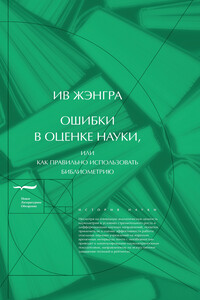
Ив Жэнгра — профессор Квебекского университета в Монреале, один из основателей и научный директор канадской Обсерватории наук и технологий. В предлагаемой книге излагается ретроспективный взгляд на успехи и провалы наукометрических проектов, связанных с оценкой научной деятельности, использованием баз цитирования и бенчмаркинга. Автор в краткой и доступной форме излагает логику, историю и типичные ошибки в применении этих инструментов. Его позиция: несмотря на очевидную аналитическую ценность наукометрии в условиях стремительного роста и дифференциации научных направлений, попытки применить ее к оценке эффективности работы отдельных научных учреждений на коротких временных интервалах почти с неизбежностью приводят к манипулированию наукометрическими показателями, направленному на искусственное завышение позиций в рейтингах.
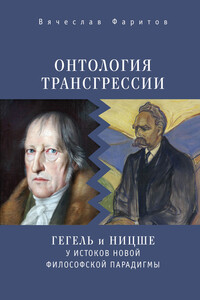
Монография посвящена исследованию становления онтологической парадигмы трансгрессии в истории европейской и русской философии. Основное внимание в книге сосредоточено на учениях Г. В. Ф. Гегеля и Ф. Ницше как на основных источниках формирования нового типа философского мышления.Монография адресована философам, аспирантам, студентам и всем интересующимся проблемами современной онтологии.
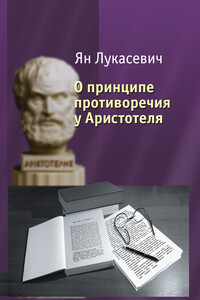
Книга выдающегося польского логика и философа Яна Лукасевича (1878-1956), опубликованная в 1910 г., уже к концу XX века привлекла к себе настолько большое внимание, что ее начали переводить на многие европейские языки. Теперь пришла очередь русского издания. В этой книге впервые в мире подвергнут обстоятельной критике принцип противоречия, защищаемый Аристотелем в «Метафизике». В данное издание включены четыре статьи Лукасевича и среди них новый перевод знаменитой статьи «О детерминизме». Книга также снабжена биографией Яна Лукасевича и вступительной статьей, показывающей мучительную внутреннюю борьбу Лукасевича в связи с предлагаемой им революцией в логике.

М.Н. Эпштейн – известный филолог и философ, профессор теории культуры (университет Эмори, США). Эта книга – итог его многолетней междисциплинарной работы, в том числе как руководителя Центра гуманитарных инноваций (Даремский университет, Великобритания). Задача книги – наметить выход из кризиса гуманитарных наук, преодолеть их изоляцию в современном обществе, интегрировать в духовное и научно-техническое развитие человечества. В книге рассматриваются пути гуманитарного изобретательства, научного воображения, творческих инноваций.
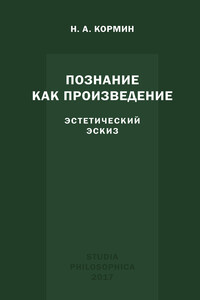
Книга – дополненное и переработанное издание «Эстетической эпистемологии», опубликованной в 2015 году издательством Palmarium Academic Publishing (Saarbrücken) и Издательским домом «Академия» (Москва). В работе анализируются подходы к построению эстетической теории познания, проблематика соотношения эстетического и познавательного отношения к миру, рассматривается нестираемая данность эстетического в жизни познания, раскрывается, как эстетическое свойство познающего разума проявляется в кибернетике сознания и искусственного интеллекта.
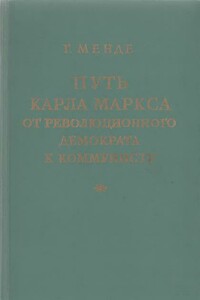
Автор книги профессор Георг Менде – один из видных философов Германской Демократической Республики. «Путь Карла Маркса от революционного демократа к коммунисту» – исследование первого периода идейного развития К. Маркса (1837 – 1844 гг.).Г. Менде в своем небольшом, но ценном труде широко анализирует многие документы, раскрывающие становление К. Маркса как коммуниста, теоретика и вождя революционно-освободительного движения пролетариата.

Книга будет интересна всем, кто неравнодушен к мнению больших учёных о ценности Знания, о путях его расширения и качествах, необходимых первопроходцам науки. Но в первую очередь она адресована старшей школе для обучения искусству мышления на конкретных примерах. Эти примеры представляют собой адаптированные фрагменты из трудов, писем, дневниковых записей, публицистических статей учёных-классиков и учёных нашего времени, подобранные тематически. Прилагаются Словарь и иллюстрированный Указатель имён, с краткими сведениями о характерном в деятельности и личности всех упоминаемых учёных.